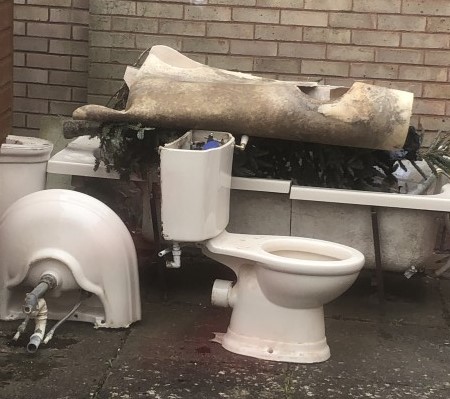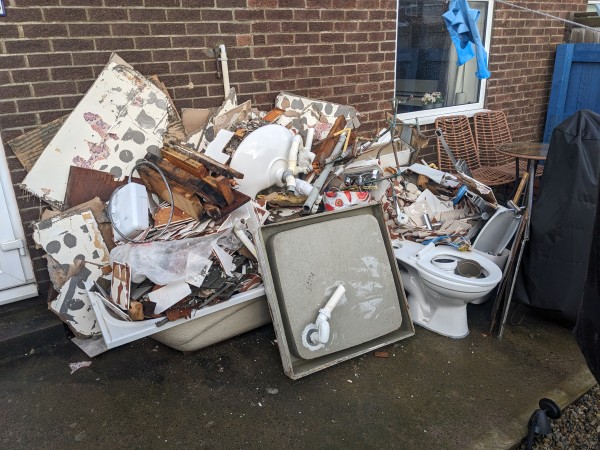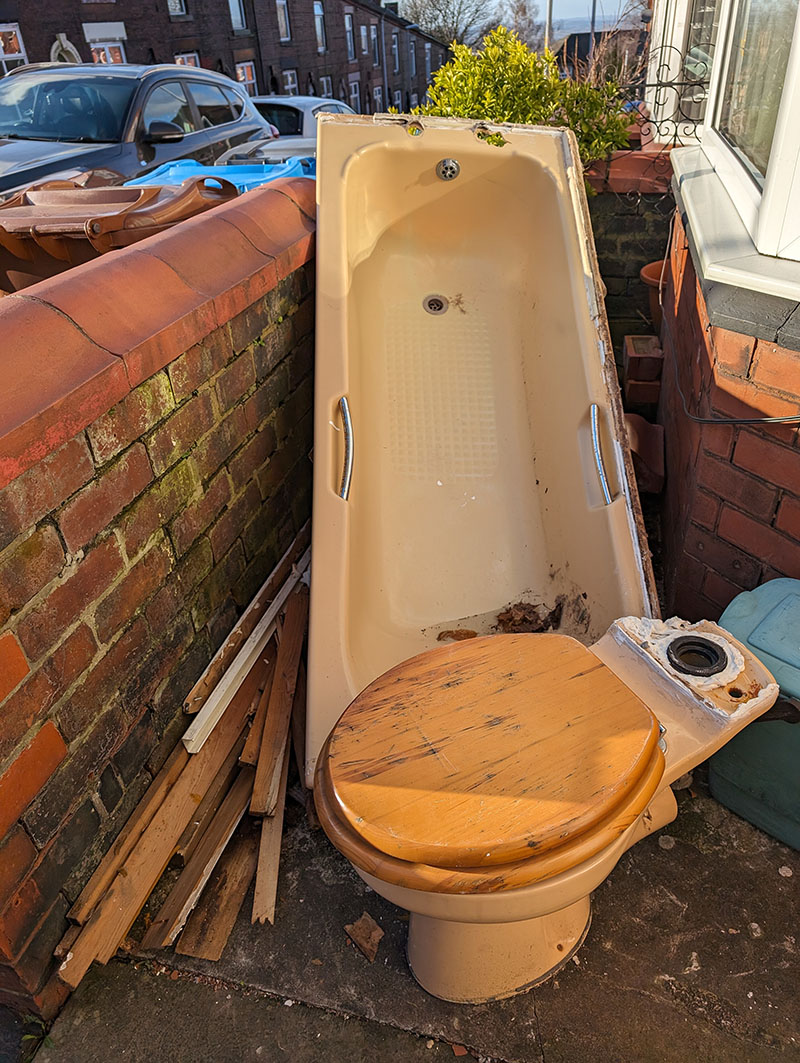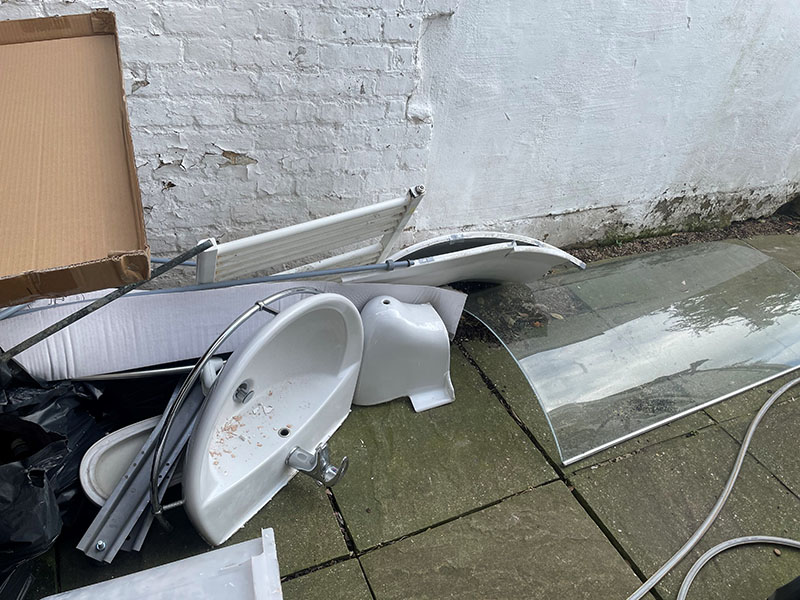Bathroom Waste Removal & Disposal Service: Comprehensive Guide
 Edited by Ali Lijee
Edited by Ali Lijee
Looking to freshen up your bathroom? Turn to Rubbish.com for bathroom waste removal services from licensed waste carriers operating across the UK. Our member partners can remove any rubbish from your bathroom, all at competitive and fair prices. Whether you’re remodelling your entire bathroom or you need to dispose of fixtures or décor from your bathroom, leave the heavy lifting to our hardworking rubbish removal teams.
We remove and dispose of bathroom waste
Table of contents:
- Bathroom waste removal & disposal services UK
- Bathroom waste removal service near you
- Gallery of bathroom waste we have removed
- Bathroom waste removal & disposal: questions people commonly ask
Bathroom waste removal & disposal services UK
Bathroom waste removal in the UK is an essential house clearance task that’s needed to keep your bathroom clean and tidy. Whether you’re partially or completely remodelling your bathroom or you need to get rid of some bathroom waste such as fixtures or décor, our licensed waste carriers can help.
Rubbish.com member partners can sort, collect, and haul away a wide variety of bathroom waste including DIY & builder’s waste, toilets, shower enclosures, mirrors, tiles, sinks and faucets, vanities, bathroom cabinets, towel racks, water heaters, bathtubs, partition walls, bathroom accessories, and much more.
Bathroom waste removal service near you
There aren’t many things more comforting than a nice hot shower or taking care of business on the loo, but getting rid of unwanted bulky waste from your bathroom can feel quite good and leave your cosy bathroom feeling clean and tidy once again.
Put your mind at ease and leave the heavy lifting of bathroom fixtures and other rubbish to the dependable man and van rubbish clearance teams found here on Rubbish.com.
Gallery of bathroom waste we have removed
Bathroom waste removal & disposal: questions people commonly ask
How much does it cost to remove a bathroom in the UK?
To completely remove a bathroom in the UK, including fixtures, tiles and flooring, and all builder’s waste, expect to pay anywhere from around £300 to £1,000 or more, depending on the size of the bathroom and the amount of rubbish and bulky waste.
How much does it cost to rip out and replace a bathroom?
The total cost of removing and replacing a bathroom can vary from as little as around £2,000 to £6,000 for a budget-friendly basic bathroom or £15,000 or more for luxurious bathrooms. This includes the cost of removing the existing bathroom (around £300-£1,000) and the cost of installing and finishing the new bathroom (around £700-£1,300). These figures can go up significantly depending on your preferences and the amount of labour required.
How long does it take to rip out and refit a bathroom?
It should generally take around 2 weeks to rip out and refit a typical bathroom in the UK. Depending on the skill and experience of the contractor (if hiring one), a basic bathroom can be removed, refitted and finished in around 6-14 business days. Larger, more complex, and/or more luxurious bathrooms might take around 3 weeks to complete.
Does it cost a lot to move a bathroom?
To move a bathroom to another room of your home, the costs can be significantly higher and it may or may not be feasible to redo the plumbing. In addition to the costs of removing and refitting the bathroom, expect to pay up to £1,000 to have the plumbing redone so that your fixtures can be installed in the new bathroom.
How long does it take to demolish a bathroom?
It generally should only take one to two days to fully demolish a standard bathroom in the UK and to haul away the waste and rubbish. This can take longer if you have a much larger bathroom or if the labour required is more complex, such as having to redo plumbing. To remove individual bathroom waste such as toilets, shower doors, or bathroom accessories, the process might only take an hour or two with a qualified rubbish removal team.
How long does it take to refit a small bathroom?
It generally takes around two full weeks for a qualified contractor to refit a small bathroom in the UK. The entire process can take anywhere from 6-14 days or longer if the bathroom requires additional labour such as plumbing work or underfloor heating, for example.
How hard is it to replace a bathroom?
Bathroom replacement can be highly complicated and it is generally not recommended to DIY bathroom remodelling. Minor bathroom refits and improvements such as replacing a vanity, replacing some tile and grout, or swapping a shower head can be fairly easy and safe to DIY.
Replacing fixtures and working with plumbing or electrical connections, however, is not recommended for homeowners as a DIY project. Contact a qualified plumber, electrician, or plasterer for the best results.
Can a bathroom be fitted in a day?
A small bathroom can be fitted in a day provided that the work mostly involves swapping out some fixtures such as a sink or toilet and reusing the same plumbing. Minor cosmetic work such as retiling a wall or fitting a new shower enclosure might only take a few hours to a full day. Full bathroom refits generally take much longer than a day, perhaps around two full weeks depending on the complexity and size of the bathroom.
Can I fit a bathroom myself?
You can fit your entire bathroom by yourself if you have the materials, tools, and knowledge needed to do so. This can be a highly cost-effective alternative to hiring a contractor, but it can also be complex if you lack the requisite expertise for tasks such as refitting a toilet or bathtub, for example. You do not need a plumber to refit fixtures with existing plumbing lines, but if you intend to move your toilet, sink, or other fixture, you should contact a professional plumber.
How do you remove an unwanted toilet?
Unwanted toilets and other bathroom waste can sometimes be collected by your local council as part of their bulky waste collection service. Note that many councils do not accept DIY & builder’s waste and your contractor is responsible for the disposal of unwanted waste and rubbish. You can also save time and money by hiring an independent licensed waste carrier to haul away your unwanted toilet.
How much does it cost to remove a toilet in the UK?
The cost of removing a toilet in the UK can vary from around £80 to £100, including the disconnection of the toilet from the plumbing and loading and disposing of the toilet at a designated waste facility. You may be able to save money by disconnecting the toilet yourself, but this can take half an hour to a few hours depending on your level of skill and expertise.
Can you move a toilet in the UK?
Yes. If you intend to move your toilet to a different room in your home, you must ensure that the room either already has plumbing connections in place to install the fixture or you must have the plumbing redone to accommodate the toilet. The cost of redoing plumbing, such as closing connections from your existing bathroom and installing them in the new bathroom, can vary from around £800 to £1,000.
How often do you need to replace a toilet?
Most toilets need to be replaced every 10 to 15 years, on average. High-quality toilets that are well cared for and routinely maintained can last well beyond this approximate lifespan, however, sometimes for half a century or longer. Failure to care for your toilet can shorten the lifespan, however.
How long does it take to remove and replace a toilet?
It generally takes around half an hour to one hour to remove an existing toilet and another hour to two hours to install a new toilet. Altogether, it may take anywhere from 1-4 hours to remove and replace a toilet depending on your level of skill and expertise.
How much does it cost to fit a shower enclosure in the UK?
The cost of fitting a shower enclosure in the UK generally starts at around £2,000 and can cost as much as around £4,500 for high-end shower enclosures. These figures are highly variable depending on your choice of contractor, the amount of labour required, whether or not you require a professional plumber, and the cost of materials such as tiling, shower pan, shower glass, and shower door.
Do you need a plumber to replace a shower?
It is generally recommended to hire a plumber to replace your shower. A plumber can ensure that the shower’s plumbing connections are up to code. You will, however, need a certified electrician to wire and test the electric components and to ensure that your shower is safe to use. Always choose a Part P-certified plumber and/or electrician for your bathroom remodelling projects.
How long should a shower enclosure last?
A shower enclosure can last for around 20 years or longer depending on how well it is maintained. High-quality shower enclosures made of durable materials and fitted by a professional contractor can last for longer.
Is it easy to remove a shower enclosure?
Removing a shower enclosure can be laborious and time-consuming, depending on your level of expertise. Fibreglass or acrylic shower enclosures can be removed by dissolving any adhesives used to bond the enclosure to the surrounding walls and wedged apart with a hammer and chisel. Tiled shower enclosures can be systematically demolished with a hammer and chisel as well.
Is it easy to remove shower head?
Most shower heads can be removed easily by simply twisting the shower head in a counterclockwise direction (to the left) and pulling the loose shower head from the shower pipe. If the shower head is stuck and won’t come out easily, carefully hold onto the shower pipe and try twisting it off.
For shower heads still stuck to the shower pipe, consider using a wrench or pliers to help twist it off, or attach a bag with vinegar around the connection to dissolve minerals that could be blocking the shower head.
How do you remove a toilet from a concrete floor?
Toilets that have been cemented directly into the floor can be removed by breaking off the cement surrounding the toilet and removing the toilet afterwards. Ensure that the plumbing has been disconnected and the water valve has been turned off.
If the toilet is instead bolted directly into a concrete floor, remove the bolts and you should then be able to easily remove the toilet.

 GET QUOTES
GET QUOTES


